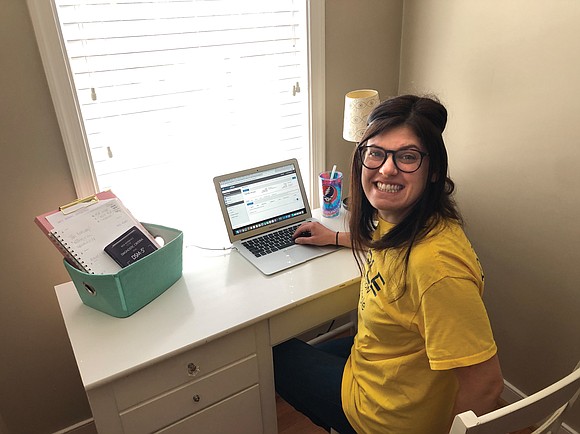Telehealth grows during pandemic as safe way to confer with health professionals
Jeremy M. Lazarus | 4/16/2020, 6 p.m.

Richmonder Melissa Hanson survived a vicious assault, but she still lives with the physical damage, mental scars and post-traumatic stress disorder.
Like many people needing mental health therapy, Ms. Hanson found the pandemic disrupted her ability to meet with her caseworker three times a week and to get help with errands such as grocery shopping.
Suddenly, she was anxious about going to the office for therapy, and she found phone communication wasn’t the same.
“I needed someone to talk with face to face,” Ms. Hanson said. “Phone calls just didn’t work for me.”
She is grateful that Simple Intervention, the Chester-based private behavioral health agency handling her case, found a solution for her and the 40 other clients it serves.
Their solution: Distribute iPads and Amazon Fire Sticks to ensure clients have two-way visual communication and can continue to talk with their assigned mental health professional.
“It’s made all the difference,” Ms. Hanson said. “I don’t know what I would do without it.”
Amid the pandemic, video calling is exploding on cell phones, via tablets and computers and even on Smart TVs. Providers are reporting major increases in use by families to stay connected, by faith groups to hold online services, by office workers to keep in touch and for people to order goods and even participate in funerals — all while maintaining social distancing.
Telehealth and telemedicine — the video connection of doctors or nurses at one site with medical professionals or patients at another — has been around for years. But that link is ramping up as private doctors, hospitals and other health providers use it to connect with people who ordinarily would come to a physical location for appointments.
Now during the pandemic, Richmond medical professionals are seeing patients via video calls and eliminating office visits.
On Monday, Dr. Michael Rao, president of Virginia Commonwealth University, noted that 1,200 telehealth calls are coming in daily now that most medical clinics are closed.
“We’re seeing patients we might not have been able to before,” he said.
Telehealth also could help reduce the COVID-19 patient load.
For example, VCU Health has established a pilot program that allows ambulance personnel in rural areas such as the Northern Neck to have a video connection with VCU physicians to discuss whether transport is needed before rushing a patient who has COVID-19 symptoms to a hospital.
The use of video calling is relatively new in the mental health field, where the preference has been for direct interaction between patient and professional.
Shatara Price, business manager for the six-year-old Simple Intervention, said she proposed the telehealth approach as the staff brainstormed ways to keep connected with clients while limiting contact.
“We realized we needed to do something. Many of our clients were no longer comfortable coming for in-patient treatment,” Ms. Price said. “Now we can provide the same level of service.”
Simple Intervention serves clients who primarily are on Medicaid. Some need short-term mental health services after a crisis that led to a brief hospitalization, Ms. Price said. Others are patients like Ms. Hanson, who need ongoing treatment and other assistance that comes with the program, she said.
“We bought the equipment because many of our clients are low income and we knew they couldn’t afford it,” Ms. Price said. “We were ready to go by March 26,” or four days before Gov. Ralph S. Northam issued the state stay at home order.
“As a result, our agency has not missed a beat in maintaining the relationships and connections with clients,” Ms. Price said.







